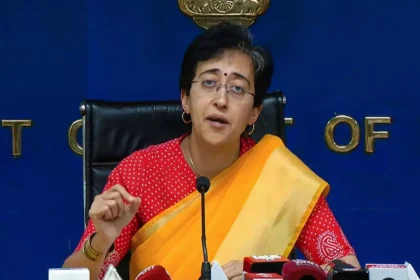Introduction:
Atishi Marlena Singh has officially been appointed as the new Delhi Chief Minister, marking a transformative moment in the capital’s political landscape. The Aam Aadmi Party (AAP) chose Atishi, a prominent leader and key figure in the party, to succeed Arvind Kejriwal. Following Kejriwal’s resignation amidst ongoing legal issues, Atishi’s appointment as the new Delhi Chief Minister signals a strategic move by AAP to maintain its progressive governance in the capital. This article delves into Atishi’s background, her political journey, and the significance of her new role as the Chief Minister of Delhi.
Atishi's Background and Early Life:
Atishi Marlena Singh was born on June 8, 1981, to a family of academicians in Delhi. Her parents, Vijay Singh and Tripta Wahi, were professors at Delhi University, nurturing a strong academic environment for Atishi. She completed her schooling at Springdales School in Delhi, later pursuing her undergraduate degree in History from St. Stephen’s College, Delhi University, in 2001. Atishi’s pursuit of excellence led her to the University of Oxford on a Chevening scholarship, where she completed her master’s degree in History in 2003. She further expanded her academic credentials as a Rhodes Scholar at Magdalen College, Oxford, in 2005.
Before stepping into politics, Atishi spent several years in a small village in Madhya Pradesh, engaging in organic farming and working with non-profit organizations focused on education. This grassroots experience shaped her perspective on policy-making and governance, laying the foundation for her future role as the new Delhi Chief Minister. Her journey from academia to activism positioned her uniquely to understand and address the complex challenges of urban governance in a city like Delhi.
Political Journey with AAP:
Atishi’s association with the Aam Aadmi Party began during the party’s early days. She played a pivotal role in shaping AAP’s policies and was an influential member of the Manifesto Drafting Committee for the 2013 Assembly election. Atishi’s deep involvement in education and policy-making quickly made her an asset to AAP, aligning with the party’s vision for a progressive and inclusive governance model. Her contributions were crucial in AAP’s rise as a significant political force in Delhi.
In 2019, Atishi was elected as the MLA for Kalkaji, marking a new phase in her political career. As part of the Delhi Cabinet, she initially served as an advisor to former Deputy Chief Minister Manish Sisodia, focusing on education reforms. During her tenure, she was instrumental in implementing landmark initiatives like the ‘Happiness Curriculum’ and the ‘Entrepreneurship Mindset Curriculum’ in Delhi’s government schools. These initiatives not only transformed the educational landscape in Delhi but also earned Atishi recognition as an innovative leader in public policy.

Why Atishi was Chosen as the New Delhi Chief Minister:
Atishi emerged as the frontrunner to become the new Delhi Chief Minister following the resignation of Arvind Kejriwal. Her appointment was a strategic choice by the Aam Aadmi Party, considering her extensive experience in governance and her deep understanding of Delhi’s unique challenges. Atishi’s proactive leadership was evident when she took on multiple portfolios, including Education, Finance, Planning, PWD, Water, Power, and Public Relations, during Kejriwal’s absence. Her handling of these key departments, particularly the education portfolio, showcased her ability to lead the government effectively.
Atishi’s central role in the party became more pronounced after Kejriwal and Manish Sisodia were embroiled in legal controversies related to the liquor policy case. With both leaders facing legal hurdles, Atishi stepped up, becoming the face of AAP’s governance and media engagements. She led the party’s initiatives during the Lok Sabha elections, thereby solidifying her status as a prominent leader capable of steering the party through turbulent times. This visibility and experience made her the obvious choice to take on the mantle of the new Delhi Chief Minister.

Her Impact as the New Delhi Chief Minister:
As the new Delhi Chief Minister, Atishi’s impact is expected to be significant, particularly in the areas of education, healthcare, and public welfare. One of her most notable contributions to the Delhi government has been in the education sector. During her tenure as an advisor and minister, she was instrumental in introducing progressive reforms that revolutionized the public education system in Delhi. The ‘Happiness Curriculum,’ aimed at enhancing the emotional well-being of students, and the ‘Entrepreneurship Mindset Curriculum,’ focused on developing practical skills, have been key initiatives under her leadership. These reforms have positioned Delhi’s education system as a model for other states to emulate.
In addition to education, Atishi has been actively involved in addressing Delhi’s water crisis and urban infrastructure challenges. In June 2024, she led an indefinite hunger strike against the Haryana government for failing to release 100 million gallons per day of water to Delhi, highlighting her commitment to addressing critical public issues. Her efforts during this crisis, although taking a toll on her health, underscored her dedication to the welfare of Delhi’s residents.

Challenges Ahead for Atishi as the New Delhi Chief Minister:
Taking on the role of the new Delhi Chief Minister comes with its set of challenges. Delhi’s governance structure is complex, with limited control over key areas like law enforcement and land management, which fall under the central government’s jurisdiction. Navigating these challenges while addressing issues such as air pollution, urban infrastructure, public health, and education reform will be crucial for Atishi’s administration.
Moreover, Atishi steps into this role at a time when the AAP government is under scrutiny due to various controversies, including the ongoing liquor policy case. Restoring public trust and continuing AAP’s reformist agenda will be pivotal to her success as the new Delhi Chief Minister. Her leadership style, which emphasizes policy-driven governance and grassroots engagement, will be tested as she works to overcome these hurdles and implement her vision for the city.
Atishi's Strategic Role in AAP's Future:
Atishi’s appointment as the new Delhi Chief Minister is not just about leading the capital; it is also a strategic move for AAP as it seeks to expand its influence beyond Delhi. With her urban appeal, educational background, and policy expertise, Atishi is poised to resonate with AAP’s core urban, middle-class support base and attract new demographics. Her leadership will be central to AAP’s strategies in the upcoming Haryana Assembly elections and other political ventures in neighboring states.
By placing Atishi at the helm in Delhi, AAP aims to consolidate its achievements in the capital while using her leadership as a model for its governance philosophy. Her success in this role will not only shape Delhi’s future but also set a precedent for AAP’s growth on the national political stage.
Public and Political Reactions:
Atishi’s appointment as the new Delhi Chief Minister has elicited mixed reactions. Supporters of AAP view her as a capable leader who embodies the party’s commitment to clean governance and progressive policies. Her academic background and track record in public policy have been praised as assets that will serve Delhi well in the coming years. However, critics question how she will navigate the complexities of Delhi’s political landscape, particularly in relation to the central government’s influence over key areas of governance.
Conclusion:
Atishi Marlena Singh’s appointment as the new Delhi Chief Minister marks a significant transition in the city’s political narrative. Her journey from an educationist and policy advisor to the Chief Minister’s office reflects her dedication to public service and governance. As she takes on this crucial role, Atishi’s leadership will be under scrutiny, with the expectation that she will continue to advance the progressive policies that have defined AAP’s governance model. Her ability to navigate the challenges ahead will determine not only the future of Delhi but also the trajectory of AAP in the broader Indian political landscape.









